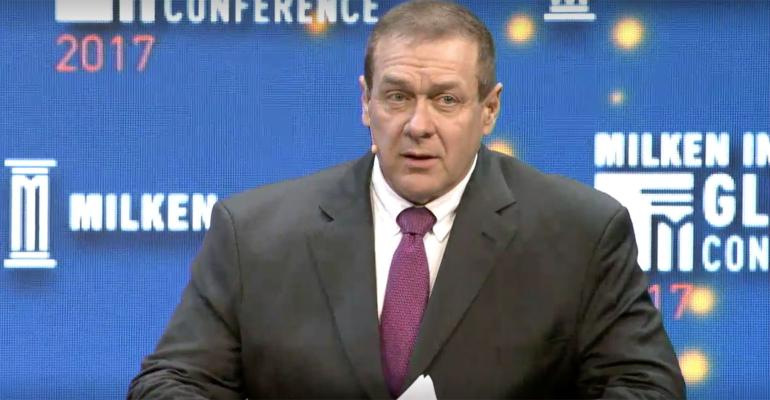(Bloomberg) -- Scott Minerd, the Guggenheim Partners chief investment officer who was regarded as one of the bond kings of the past decades, has died. He was 63.
Minerd died Wednesday at his home in Rancho Santa Fe, California, after suffering a heart attack during his regular workout. Guggenheim confirmed his death in a statement.
Guggenheim Investments will continue to be led by co-presidents Dina DiLorenzo and David Rone, and by Anne Walsh, CIO of Guggenheim Partners Investment Management, the firm said.
“Scott’s partners at Guggenheim, as well as the many colleagues Scott recruited to Guggenheim, worked with, and mentored over the years, all mourn his loss,” the firm said in its statement. “Guggenheim’s investment professionals, in tribute to Scott, will continue every day to use the processes and procedures Scott helped build to manage Guggenheim’s client portfolios.”
Minerd, barrel-chested from years of bodybuilding, was a frequent television commentator on markets and investments. He dealt in bonds, structured securities, currencies and derivatives during stints at Merrill Lynch, Morgan Stanley and Credit Suisse First Boston in the 1980s and 1990s, making him one of the era’s leaders in fixed income during the market’s four-decade bull run, along with the likes of Bill Gross, Jeffrey Gundlach and Dan Fuss.
Read more: Guggenheim’s Minerd Muscles Think-Slow Strategy to $260 Billion
Gross, co-founder of Pacific Investment Management Co., said in a 2019 Bloomberg interview that he doubted there’d be another “bond king,” but Minerd was the most likely candidate, in part because of his “great long-term perspective.”
Just a week before his death, in a Bloomberg TV interview, Minerd called the Federal Reserve’s forecast of 0.5% growth in 2023 “overly optimistic” and said he expected “another shoe to drop” in crypto after the collapse of Sam Bankman-Fried’s FTX exchange.
Minerd’s last Twitter post to his almost 160,000 followers came on Dec. 16, when he observed the Purchasing Managers Index showed US manufacturing “firmly in recession territory.”
Pennsylvania Native
The son of an insurance salesman, Minerd grew up in southwestern Pennsylvania on land his family settled before the Revolutionary War. He quit high school a year early to follow a girlfriend to Philadelphia, where he persuaded the University of Pennsylvania to let him take courses at the Wharton School.
After earning a degree in economics from Penn in 1980, he took classes at the University of Chicago’s Booth School of Business, then worked as an accountant for Price Waterhouse. He switched to investing, which paid better, and climbed Wall Street’s ranks for the better part of a decade.
Recounting his early days at Merrill Lynch and Morgan Stanley in a conversation in early November, Minerd remembered himself as a “mini-Mike Milken,” calling C-suite executives to pitch bond deals while in his mid-20s.
“I speak fondly of those days in my career,” he said. “It was rough and tumble, it was a lot of fun. It was the Wild West — pick up a telephone and call a company and ask them if you could issue a bond for them.”
In 1992, Minerd gave Morgan Stanley a big win by trading Swedish bonds after the country raised its interest rate to 500% to defend its currency.
The next year, he orchestrated a debt restructuring for Italy that helped stave off a bailout by the International Monetary Fund.
He left Morgan Stanley for CSFB in 1994, running its fixed-income credit trading group.
Dedicated Bodybuilder
Minerd had walked away from trading in the 1990s before being lured back by Guggenheim CEO and co-founder Mark Walter, a former client who ran the investment firm Liberty Hampshire. Minerd would join shortly after the firm was formed. It now has more than $285 billion in assets under management.
“Scott was a key innovator and thought leader who was instrumental in building Guggenheim Investments into the global business it is today,” Walter said in the statement. “He will be greatly missed by all.”
At his peak, the 300-pound Minerd could bench-press 495 pounds 20 times and even competed in the Super Heavyweight and over-40 divisions at Los Angeles bodybuilding championships. “I don’t like to do things halfway,” he said in a 2017 interview, describing his drive to clock a two-hour workout five days a week in the window between the time markets close in New York and open in Asia.
“If I was ever going to say ‘no’ to him, it would be by phone,” Guggenheim Executive Chairman Alan Schwartz said at the time about Minerd and his physically intimidating appearance. “But I can tell you that his heart and brain are bigger than his body.”
Minerd is survived by his husband, Eloy Mendez, according to the firm.





